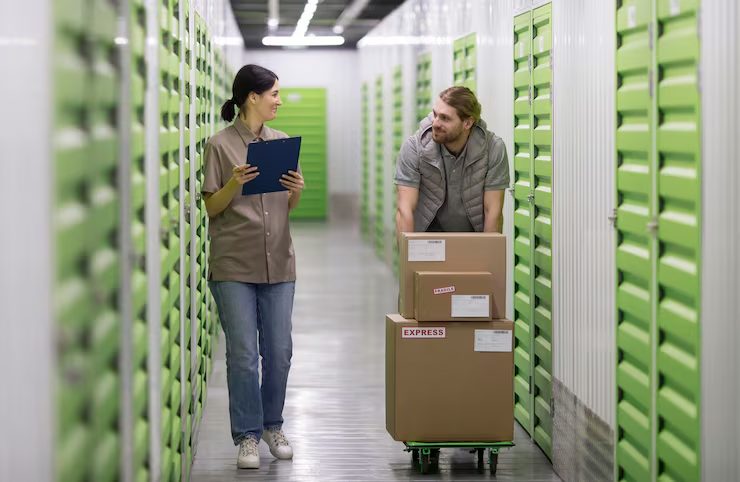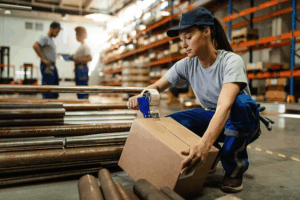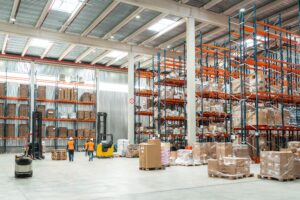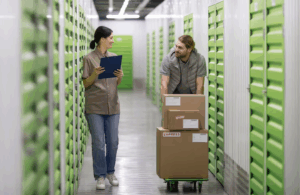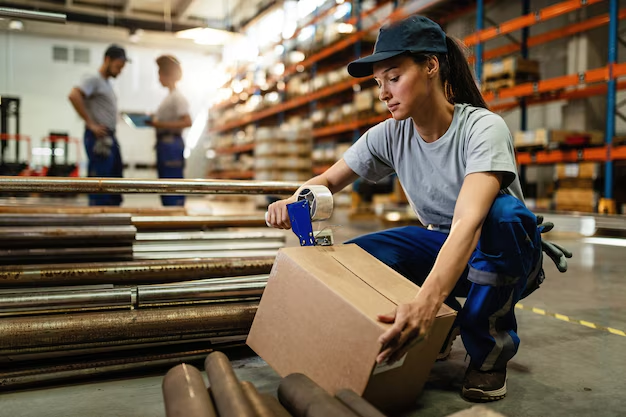In today’s fast-paced supply chains, maintaining the quality of your products is more critical than ever. Businesses handling temperature-sensitive items face unique challenges: fluctuating temperatures, high humidity, or long storage periods can compromise product integrity.
Climate-controlled storage provides a solution by regulating temperature and humidity, ensuring that products remain safe, functional, and high-quality throughout their lifecycle. From pharmaceuticals and food to electronics and fine art, proper storage is essential for product preservation, regulatory compliance, and customer satisfaction.
Partnering with a reliable provider like Lama Fulfilment helps businesses safeguard their inventory while streamlining warehouse operations and supply chain management.
Understanding Climate-Controlled Storage
Climate-controlled storage refers to warehouse or storage units where temperature and humidity are carefully regulated to protect goods. Unlike regular storage facilities, these units maintain a stable environment, reducing the risk of damage to sensitive products.
For businesses that manage temperature-sensitive items, proper storage is crucial for product preservation and maintaining quality across the supply chain. Using a professional Temperature-controlled warehousing storage provider ensures your inventory remains safe, regardless of external weather conditions.
Difference Between Climate-Controlled and Regular Storage
The main distinction lies in environmental control. Regular storage exposes products to fluctuating temperatures and humidity, which can cause degradation, spoilage, or mechanical failures. Storage with environmental control units maintain:
Consistent temperature and humidity levels.
Protection from extreme heat, cold, or moisture.
Enhanced security and monitoring systems to safeguard valuable stock.
Key Features of Climate-Controlled Units
Storage with environmental control storage units are equipped with:
Heating, ventilation, and air conditioning systems (HVAC).
Humidity control devices to prevent mould, mildew, or warping.
Temperature monitoring sensors and alerts for real-time oversight.
Shelving and organisation systems that reduce exposure to environmental risks.
These features are particularly important for maintaining product preservation and ensuring temperature-sensitive items retain their integrity throughout storage.
Why Businesses Need Climate-Controlled Storage
Businesses today handle diverse product types, many of which require strict environmental controls. Using temperature-controlled storage is no longer optional for many industries it is critical to maintaining quality and trust.
Protecting Perishable and Temperature-Sensitive Goods
Products such as food, pharmaceuticals, cosmetics, and certain chemicals degrade rapidly if not stored properly. Climate-controlled storage mitigates these risks by:
Preventing spoilage due to excessive heat or cold.
Reducing risk of contamination or product degradation.
Extending shelf life for perishable goods and sensitive materials.
For businesses dealing with high-value or regulated items, partnering with a climate-controlled storage provider ensures compliance and consistent product quality.
Ensuring Long-Term Product Integrity
Even non-perishable goods can suffer long-term damage if exposed to fluctuating conditions. Paper, electronics, textiles, and fine art can warp, corrode, or fade. Climate-controlled storage maintains stable conditions, enabling:
Preservation of structural and aesthetic quality.
Reduced waste due to product spoilage.
Long-term protection of inventory value.
Industries That Benefit Most from Climate-Controlled Storage
Certain industries rely heavily on climate-controlled environments to safeguard their products and maintain compliance with industry regulations.
Pharmaceuticals and Healthcare Products
Medicines, vaccines, and biologics often require strict temperature ranges. Using climate-controlled storage for these temperature-sensitive items ensures proper product preservation, allowing healthcare providers and distributors to:
Maintain efficacy of sensitive medicines.
Comply with regulatory requirements.
Ensure safe delivery to clinics, hospitals, and patients.
Electronics, Art, and Specialty Items
Electronics, collectibles, and artworks can be highly sensitive to heat, moisture, or light. Proper storage reduces risks such as:
Corrosion of electronic components.
Warping, cracking, or fading of artistic materials.
Loss of value due to environmental damage.
Using professional Environmentally regulated storage services ensures that high-value or specialised items remain protected while in storage or transit.
How Climate Control Enhances Supply Chain Reliability
Climate-controlled storage is not just about protection it also contributes to more reliable supply chains. Businesses can confidently manage stock knowing that environmental factors will not compromise their products.
Reducing Risks of Product Damage
By stabilising temperature and humidity, climate-controlled units prevent:
Heat-related chemical reactions in sensitive items.
Moisture-related mould or corrosion.
Unintended spoilage that can disrupt stock levels.
This reduces unexpected losses, decreases returns, and ensures that products reach customers in optimal condition.
Improving Customer Satisfaction
Reliable product quality directly affects customer satisfaction. When items arrive in perfect condition:
Brands build trust and credibility.
Return rates decline, improving operational efficiency.
Businesses can maintain consistent delivery of high-quality goods.
For businesses managing temperature-sensitive items, climate-controlled storage is an essential tool for meeting customer expectations and supporting product preservation.
Environmental and Safety Considerations
Maintaining an Environmentally regulated storage facility involves attention to both environmental and safety standards. Proper design and monitoring in professional warehouse storage solutions protect employees, products, and the surrounding environment.
Maintaining Compliance with Standards
Many industries have regulatory requirements for storage conditions. Temperature-controlled units help businesses:
Adhere to pharmaceutical or food safety regulations.
Ensure electronic or sensitive materials are stored within manufacturer specifications.
Meet international shipping and storage compliance standards.
Safeguarding Workers and Products
Well-designed climate-controlled storage also reduces safety risks:
Preventing heat or cold stress for staff.
Minimising exposure to hazardous conditions.
Ensuring secure handling of valuable or delicate inventory.
Best Practices for Using Climate-Controlled Storage
Simply having Climate-managed facilities is not enough. Proper management and operational practices ensure maximum benefit and minimal risk.
Monitoring Temperature and Humidity Levels
Regular monitoring is essential for maintaining consistent conditions. Businesses should:
Install sensors for real-time tracking.
Receive alerts if conditions deviate from the required range.
Perform routine audits to confirm equipment is functioning properly.
Organising and Rotating Inventory Properly
Even in controlled environments, correct organisation ensures product integrity:
Store items according to temperature and handling requirements.
Rotate stock to use older inventory first.
Label items clearly to prevent confusion and errors.
Implementing these practices enhances product preservation and protects temperature-sensitive items from potential storage damage.
Summary and Next Steps
Climate-controlled storage plays a critical role in protecting products, especially for businesses handling temperature-sensitive items. By maintaining consistent temperature and humidity levels, these storage solutions prevent spoilage, degradation, and damage, ensuring long-term product preservation.
Using professional Climate-managed facilities allows businesses to safeguard inventory, maintain regulatory compliance, and deliver high-quality products consistently. Reliable storage also supports supply chain efficiency, reduces losses, and builds customer trust by ensuring that goods arrive in optimal condition.
For businesses ready to safeguard their inventory and optimise fulfilment, partnering with a professional provider is essential. Learn more about Lama Fulfilment how they combine technology, expertise, and climate-controlled storage solutions to protect your products and support your business growth.
Frequently Asked Questions
What types of products require climate-controlled storage?
Perishable foods, pharmaceuticals, cosmetics, electronics, fine art, and other temperature-sensitive items all benefit from climate-controlled storage.
How does climate-controlled storage differ from regular storage?
These units regulate temperature and humidity, whereas regular storage exposes goods to environmental fluctuations that can damage sensitive items.
Can climate-controlled storage extend product shelf life?
Yes. By maintaining stable environmental conditions, businesses can significantly reduce spoilage, degradation, and other risks to product integrity.
Is climate-controlled storage necessary for all industries?
While not required for all industries, any business dealing with perishable or temperature-sensitive items benefits from climate control.
How can a business choose a climate-controlled storage provider?
Look for providers with robust monitoring systems, compliance with industry standards, and experience handling similar products. Lama Fulfilment offers professional climate storage services tailored for various industries.

